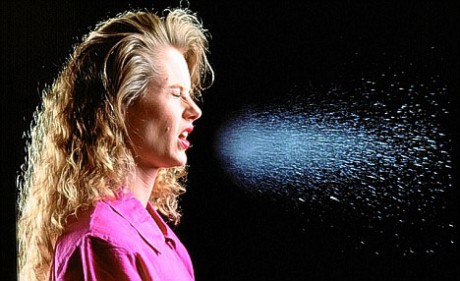
he symptoms of influenza usually develop over a matter of a few hours and include a high temperature, sore muscles, dry cough, headache and sore throat.
PEOPLE in Donegal in high-risk groups have been encouraged by the HSE Health Protection Surveillance Centre to get vaccinated against influenza, as the number of reported cases of influenza-like illness (ILI) in Ireland has increased in the past week.
The warning comes as HSE chiefs have admitted their anti-flu vaccine is for a different strain of the illness than the one which has hit the country, prompting fears a major outbreak will send the trolley crisis in hospitals spiralling.
With Ireland in the grip of an eight-week flu season, HSE director general Tony O’Brien warned of particular “risks” as he made the revelation while giving evidence to the Oireachtas health committee on the bed shortage in hospitals which saw more than 600 patients forced onto trolleys and chairs last week.
“An added complication is that the particular strain of flu which has traversed the Atlantic, as it always does each year, is not the strain of flu that was predicted and therefore is not the strain of flu for which we vaccinated the health workers and the general population, so there are particular risks in that area,” Mr O’Brien said.
The warning came after Health Minister Leo Varadkar insisted people should take the vaccine as he admitted to the committee a flu outbreak was already under way.
“It is the case now that influenza-like illness rates have risen from 15.5 per 100,000 to 29 per 100,000 this week. So we are seeing an influenza outbreak, so obviously the advice to that is what it always is – people who are high-risk should get vaccinated,” the minister said.
Mr O’Brien made it clear the flu outbreak could have a negative impact on the trolley crisis.
HPSC director, Dr Darina O’Flanagan warned that flu was actively circulating in the community.
“Although flu is starting to circulate, flu levels currently remain relatively low. Despite this, we have had a number of confirmed influenza outbreaks, mainly in residential facilities for the elderly and disabled. Influenza is expected to increase over the coming weeks and circulate for at least the next 6-8 weeks. Prevention is better than cure, and the increase in flu activity means it is even more important to get your flu jab if you are in an at-risk group.
“The vaccine is available free of charge from GPs for all people in at risk groups, and from pharmacists for everyone aged 65 and over. An administration charge may apply to people who don’t hold medical cards or GP visit cards.”
At-risk groups are: All those aged 65 years and older; People including children with chronic illness requiring regular medical follow-up such as chronic lung disease, chronic heart disease, chronic neurological disorders, neuro-developmental disorders and diabetes. Those with lower immunity due to disease or treatment. All pregnant women. The vaccine can be given at any stage of pregnancy. Those with morbid obesity i.e. Body Mass Index ≥ 40. Residents of nursing homes, old people’s homes and other long stay facilities. Health care workers and carers of those in risk groups.
Treating flu
Most people, unless they are in an at risk group, can get better themselves at home. Advice, tips, information and videos on getting over flu and other common illnesses are available at a new HSE website www.undertheweather.ie.
The site was developed by the HSE along with GPs and pharmacists and is a great resource for people to get advice and get better.
“The symptoms of influenza usually develop over a matter of a few hours and include a high temperature, sore muscles, dry cough, headache and sore throat. This is different from the common cold, which tends to come on more gradually and usually includes a runny nose and a normal temperature.
“Anyone who gets flu should stay at home, rest, drink plenty of fluids and use over-the-counter remedies like paracetamol to ease symptoms. Anyone in one of the high-risk categories should contact their GP if they develop influenza symptoms. GPs may wish to prescribe antivirals for those presenting with influenza in the high risk groups.
“Covering your nose and mouth with a tissue when you cough and sneeze, disposing of the tissue as soon as possible and cleaning your hands as soon as you can are important measures in helping prevent the spread of germs and reducing the risk of transmission,” added Dr. O’Flanagan.









